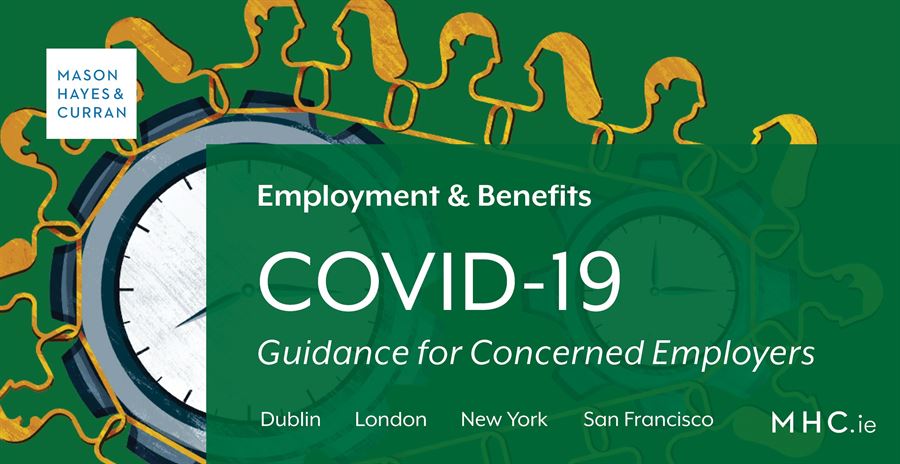
With the spread of coronavirus, or COVID-19, showing no signs of abating, Irish employers should consider their obligations towards employees in the event of a public health crisis emerging in Ireland.
Employer obligations
Employers have a duty of care towards employees and are required to take steps to comply with their obligations regarding workplace health and safety. Employers should carry out risk assessments in light of the global emergency, particularly in international organisations where staff travel regularly in the course of their work. Where a risk of employees potentially contracting the virus is identified, the employer should consider what measures they should take to control that risk, such as restricting certain travel arrangements. On a more basic level, the World Health Organisation has issued guidelines for the public to minimise the spread of infection. Employers may find this advice useful in communicating ways in which their staff can protect themselves and their fellow employees from infection. These measures may include:
- Ensuring there is adequate ventilation in the workplace
- Providing alcohol-based hand sanitisers and
- Reminding employees to stay at home if they experience flu-like symptoms
Managers should be trained in reinforcing these practices to employees, particularly in open plan offices.
Be flexible, be pre-emptive
Given that fewer employees attending the workplace will naturally correspond to a reduction in the spread of infections, employers may consider facilitating employees to work from home or allowing them to work remotely where possible. Employers should take a flexible approach and review their practices as the situation develops. By way of example, significant global employers in Dublin have taken the precautionary move of asking their staff to work from home where a worker presented symptoms similar to coronavirus or had travelled to an infected area. Other employers have carried out/are carrying tests on the capabilities of their remote systems supporting a situation where their entire work force are required to work from home.
Further measures
As employers must protect health and safety as far as practicable and provide a safe place of work for their employees, permitting employees to work from home should be considered where risks to employees cannot be avoided. Employers may consider reducing non-essential business travel or conduct meetings via video link instead of in person.
Review employment terms now
Where it becomes necessary to close a workplace, employers should request that employees work from home where feasible and continue to pay employees as normal. Failure to comply with contractual obligations to pay employees in circumstances where they are available for work may lead to breach of contract and/or payment of wages claims against an employer, unless the employer has provided for an unpaid period of lay-off in the employment contract.
Employers may also wish to review employment terms in their contracts for emergency provisions situations or where the threat of a pandemic necessitates closure of a workplace. Where it is not possible for employees to work from home in the event that a workplace must be closed, other measures should be considered. These may include requiring employees to take annual leave or paid leave until the health and safety risk is eliminated.
State sick pay measures
Following a meeting of the Cabinet Sub-Committee,which was set up in response to the outbreak of Covid-19 in Ireland, it was announced by Taoiseach Leo Varadkar that emergency legislation will be put through Dáil Éireann next week. The new legislative measure will provide the following:
-
The rate of State sick pay will be increased from €203, per week(current maximum) to €305 per week, for up to two weeks absence with medical certification.
-
Sick pay will be payable from the first day of absence i.e. the usual 6 day waiting period will be waived.
-
State sick pay will be available for the self-employed.
-
A minimum number of PRSI contributions is not required in order to be eligible for the payment.
-
All other existing State sick pay arrangements will continue to apply, including payments workers receive in respect of dependent adults.
-
State sick pay benefit may be made payable retrospectively to the date of the announcement.
Conclusion
Aside from public health concerns, flexible working emerged as a key issue in the recent general election and is on course to remain a focus of the new government in 2020. In light of this, employers should prepare their businesses for an increase in remote working requests and put in place appropriate policies.
The Government State sick pay measures do not deal with voluntary self-isolation, where a worker is not medically certified as being required to do so.
If employers decide to support voluntary self-isolation by paying workers who self-isolate where the worker is not medically certified, they could consider adopting a self-certification type approach. This could entail requiring workers to outline the basis on which they reasonably believe that they should voluntarily self-isolate. Such basis could include for example close contact with a person with the virus; a person from a country with prominent clusters of the virus; and/or the worker being a vulnerable person as a consequence of an underlying medical condition etc. to facilitate the employer in deciding if the voluntary isolation (and consequently payment) by the employer is reasonable in the circumstances.
As the situation continues to develop, employers should act prudently and monitor government advice, as well as updates from the World Health Organisation.
If you would like to discuss the potential impact of this issue on your business, please contact a member of our Employment & Benefits team.
The content of this article is provided for information purposes only and does not constitute legal or other advice.





